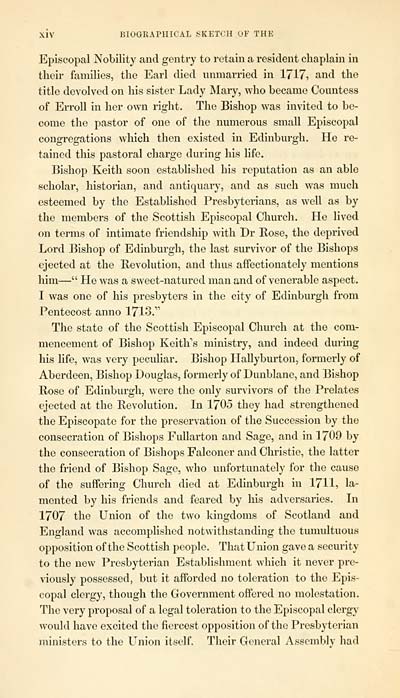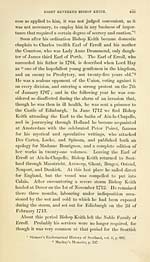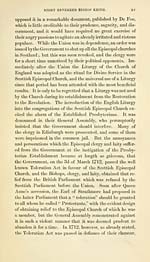Spottiswoode Society > History of the affairs of the Church and State of Scotland from the beginning of the reformation to the year 1568 > Volume 1
(22) Page xiv
Download files
Complete book:
Individual page:
Thumbnail gallery: Grid view | List view

XIV BIOGRAPHICAL SKETCH OF THE
Episcopal Nobility and gentry to retain a resident chaplain in
their families, the Earl died unmarried in 1717, and the
title devolved on his sister Lady Mary, who became Countess
of Erroll in her own right. The Bishop was invited to be-
come the pastor of one of the numerous small Episcopal
congregations which then existed in Edinburgh. He re-
tained this pastoral charge during his life.
Bishop Keith soon established his reputation as an able
scholar, historian, and antiquary, and as such was much
esteemed by the Established Presbyterians, as well as by
the members of the Scottish Episcopal Church. He lived
on terms of intimate friendship with Dr Bose, the deprived
Lord Bishop of Edinburgh, the last survivor of the Bishops
ejected at the Revolution, and thus affectionately mentions
him — " He was a sweet-natured man and of venerable aspect.
I was one of his presbyters in the city of Edinburgh from
Pentecost anno 1713."
The state of the Scottish Episcopal Church at the com-
mencement of Bishop Keith's ministry, and indeed during
his life, was very peculiar. Bishop Hallyburton, formerly of
Aberdeen, Bishop Douglas, formerly of Dunblane, and Bishop
Rose of Edinburgh, were the only survivors of the Prelates
ejected at the Revolution. In 1705 they had strengthened
the Episcopate for the preservation of the Succession by the
consecration of Bishops Fullarton and Sage, and in 1709 by
the consecration of Bishops Falconer and Christie, the latter
the friend of Bishop Sage, who unfortunately for the cause
of the suffering Church died at Edinburgh in 1711, la-
mented by his friends and feared by his adversaries. In
1707 the Union of the two kingdoms of Scotland and
England was accomplished notwithstanding the tumultuous
opposition of the Scottish people. That Union gave a security
to the new Presbyterian Establishment which it never pre-
viously possessed, but it afforded no toleration to the Epis-
copal clergy, though the Government offered no molestation.
The very proposal of a legal toleration to the Episcopal clergy
would have excited the fiercest opposition of the Presbyterian
ministers to the Union itself. Their General Assembly had
Episcopal Nobility and gentry to retain a resident chaplain in
their families, the Earl died unmarried in 1717, and the
title devolved on his sister Lady Mary, who became Countess
of Erroll in her own right. The Bishop was invited to be-
come the pastor of one of the numerous small Episcopal
congregations which then existed in Edinburgh. He re-
tained this pastoral charge during his life.
Bishop Keith soon established his reputation as an able
scholar, historian, and antiquary, and as such was much
esteemed by the Established Presbyterians, as well as by
the members of the Scottish Episcopal Church. He lived
on terms of intimate friendship with Dr Bose, the deprived
Lord Bishop of Edinburgh, the last survivor of the Bishops
ejected at the Revolution, and thus affectionately mentions
him — " He was a sweet-natured man and of venerable aspect.
I was one of his presbyters in the city of Edinburgh from
Pentecost anno 1713."
The state of the Scottish Episcopal Church at the com-
mencement of Bishop Keith's ministry, and indeed during
his life, was very peculiar. Bishop Hallyburton, formerly of
Aberdeen, Bishop Douglas, formerly of Dunblane, and Bishop
Rose of Edinburgh, were the only survivors of the Prelates
ejected at the Revolution. In 1705 they had strengthened
the Episcopate for the preservation of the Succession by the
consecration of Bishops Fullarton and Sage, and in 1709 by
the consecration of Bishops Falconer and Christie, the latter
the friend of Bishop Sage, who unfortunately for the cause
of the suffering Church died at Edinburgh in 1711, la-
mented by his friends and feared by his adversaries. In
1707 the Union of the two kingdoms of Scotland and
England was accomplished notwithstanding the tumultuous
opposition of the Scottish people. That Union gave a security
to the new Presbyterian Establishment which it never pre-
viously possessed, but it afforded no toleration to the Epis-
copal clergy, though the Government offered no molestation.
The very proposal of a legal toleration to the Episcopal clergy
would have excited the fiercest opposition of the Presbyterian
ministers to the Union itself. Their General Assembly had
Set display mode to: Large image | Transcription
Images and transcriptions on this page, including medium image downloads, may be used under the Creative Commons Attribution 4.0 International Licence unless otherwise stated. ![]()
| Permanent URL | https://digital.nls.uk/79597052 |
|---|
| Description | Volume I. |
|---|---|
| Attribution and copyright: |
|

